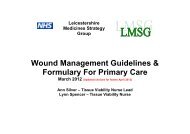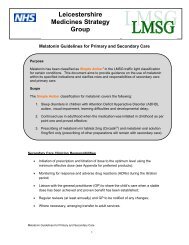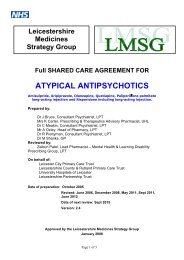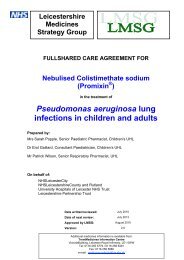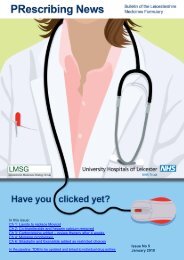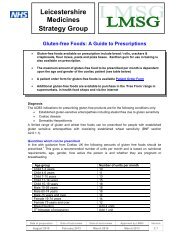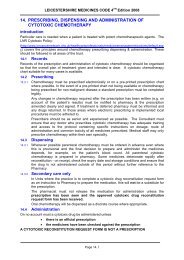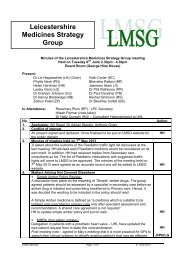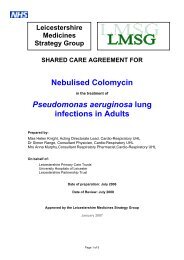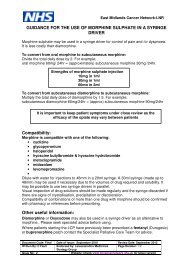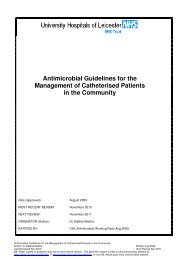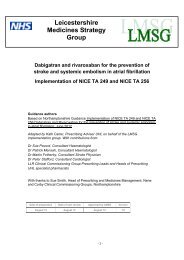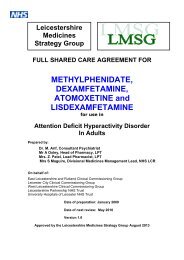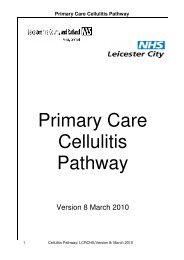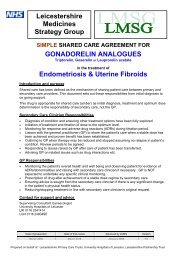Melatonin guidelines - Leicestershire Medicines Strategy Group
Melatonin guidelines - Leicestershire Medicines Strategy Group
Melatonin guidelines - Leicestershire Medicines Strategy Group
You also want an ePaper? Increase the reach of your titles
YUMPU automatically turns print PDFs into web optimized ePapers that Google loves.
<strong>Leicestershire</strong><strong>Medicines</strong> <strong>Strategy</strong><strong>Group</strong><strong>Melatonin</strong> Guidelines for Primary and Secondary CarePurpose<strong>Melatonin</strong> has been classified as Simple Amber 1 in the LMSG traffic light classificationfor certain conditions. This document aims to provide guidance on the use of melatoninwithin its specified indications and clarifies roles and responsibilities of secondary careand primary care.ScopeThe Simple Amber classification for melatonin covers the following:1. Sleep disorders in children with Attention Deficit Hyperactive Disorder (ADHD),autism, visual impairment, learning difficulties and developmental delay;2. Continued use in adulthood when the medication was initiated in childhood as perpoint one and proved effective;3. Prescribing of melatonin m/r tablets 2mg (Circadin ® ) and melatonin liquid 1mg/mlonly (prescribing of other preparations will remain with secondary care).Secondary Care Clinician Responsibilities• Initiation of prescription and titration of dose to the optimum level using theminimum effective dose;• Monitoring for response and adverse drug reactions (ADRs) during the titrationperiod;• Liaison with the general practitioner (GP) to share the child’s care when a stabledose has been achieved and proven benefit has been established;• Regular reviews (at least annually) and GP to be notified of any changes;• Where necessary, arranging transfer to adult services.<strong>Melatonin</strong> Guidelines for Primary and Secondary Care1
GP Responsibilities• Monitoring the child’s overall health and well being;• Informing the secondary care clinician of any ADRs observed or anyabnormalities from physical checks;• Prescribe ongoing supplies of melatonin.Patient/parent Responsibilities• Ensure that behavioural interventions/sleep hygiene measures continue to beimplemented even whilst on medication;• Ensure compliance with the medication.Community Pharmacist Responsibilities• Pharmacist has a professional responsibility 2 to ensure that any unlicensedmedication ordered is of good quality;• Provide appropriate measuring device (e.g. spoon or oral syringe) with themedication.Prescribing of melatonin<strong>Melatonin</strong> is not usually considered first line in sleep disorders. The following steps aretypically taken before melatonin is prescribed.Sleep chart ordiary for 2weeksTrial behaviouralinterventions or sleephygiene measures for upto 4 weeksSuccessContinue with measuresFailConsider melatonin withbehavioural interventions/sleep hygiene measuresEngagement from the family is vital and there may be instances where it is difficult orimpossible to establish behavioural interventions or sleep hygiene measures becausethe patient and/or family are struggling to cope with the current situation. In theseinstances, melatonin may be initiated at the same time as behavioural interventions orsleep hygiene measures and then withdrawn once the other interventions areestablished. Simple measures include ensuring that there is an established bedtimeroutine, removing television and computer games from the child’s room and ensuringthat the room conditions (temperature, light and noise) are at an optimum level to<strong>Melatonin</strong> Guidelines for Primary and Secondary Care2
promote sleep. In children with ADHD who are finding it difficult to settle in the evening,their ADHD medication may be optimised before considering melatonin.<strong>Melatonin</strong> is usually initiated at 2-3mg at night using the most appropriate formulationand increased depending on response to up to 10mg at night. The medication should begiven or taken around 30-60 minutes before expected bedtime. Circadin ® is a controlledrelease formulation so should be swallowed whole 3 . The controlled release profile shouldhelp with sleep maintenance and thus reduce or stop night time waking. Circadin ®tablets can be halved using a tablet cutter and this should not affect the controlledrelease profile of the formulation. At the discretion of the clinician Circadin ® can becrushed and dispersed in water if there are swallowing difficulties or if an immediaterelease profile is desired (see licensing 4 ).Circadin ® is considered first line on the basis of licensing, cost and quality of the product.<strong>Melatonin</strong> liquid 1mg/ml can be used in patients who are unable to take Circadin ® orwhere Circadin ® does not have the desired effect. In certain circumstances, othermelatonin preparations will be initiated to meet the specific needs of the patient.Prescribing of these other preparations, such as capsules, will remain in secondary care.<strong>Melatonin</strong> can be stopped abruptly should the need arise. There should be no sideeffects associated with this.Patients on melatonin will be reviewed by secondary care at least annually. There areno monitoring requirements for melatonin apart from checking for side effects andcontinued efficacy.Where appropriate, treatment should be withdrawn periodically to access continuedneed.Side effects<strong>Melatonin</strong> is generally well tolerated. Full adverse effect profile is unclear due to smallsize of trials in children. The most commonly reported side effects are: headache,dizziness, nausea and drowsiness. Other side effects include fatigue, confusion,pruritus, hypothermia, tachycardia, nightmares, mild depression, morning grogginess,and skin rashes. <strong>Melatonin</strong> can affect seizure control in patients with epilepsy, however,information is conflicting. Children with epilepsy should be closely monitored for anyincreased incidence of seizures 5 .LicensingCircadin ® is licensed in the UK for patients over 55 years of age 3 . Its use in children andadults under 55 years is therefore off label. The MHRA and various prescribing<strong>guidelines</strong> 2,6 advise that a licensed preparation should be considered first, even if it is foran off label use. As Circadin ® is licensed in the UK, its quality is assured and therefore itis safer than using an unlicensed product.<strong>Melatonin</strong> Guidelines for Primary and Secondary Care3
Currently, melatonin liquid 1mg/ml is unlicensed. In a paediatric setting, it is common toprescribe unlicensed preparations as long as there is a clinical need and there is not alicensed product to fully meet this need 6 . A letter of special clinical need may berequired.Cost (based on a dose of 4mg once daily)Product Cost per original pack Cost per year^<strong>Melatonin</strong> m/r tablets 2mg £15.39 for a pack of 30 £345Circadin ®7<strong>Melatonin</strong> liquid 1mg/ml 7,8 £100 - £141.66 for 200ml £672-£947.52bottle**melatonin liquid 1mg/ml is a specials product so its price can vary depending on where it isprocured from. There is a cap on its price though as it features in part VIIIB of the drug tariff. If asugar-free, colour-free and/or lactose free preparation is required, this can be stated on theprescription for the same price.Background and Further InformationSleep disturbance in children with neurological or behavioural disorders is common andcan be a major source of distress for the patient and family. Furthermore, sleepdisturbance can have an impact on the child’s behaviour and ability to concentrateduring the day. In ADHD for example, up to 50% of children could have sleep relatedproblems.<strong>Melatonin</strong> is an endogenous hormone produced by the pineal gland in the brain. It isimportant in the regulation of circadian rhythms in humans and animals and a number ofstudies have shown that exogenous melatonin has beneficial effects on the sleeppatterns of these groups of children 5 . Many paediatricians and child psychiatrists areusing melatonin for difficult sleep problems in the UK.Further Advice and SupportSupervising consultant or Dr C S PrasannaChild and Adolescent Mental HealthService<strong>Leicestershire</strong> Partnership NHS TrustTel: 0116 225 2900Fax 0116 225 2899email:chikkagoragatta.prasanna@leicspart.nhs.ukSupervising Consultant or Dr AdrianBrookeConsultant Paediatrician/Lead ConsultantFYPC<strong>Leicestershire</strong> Partnership NHS TrustTel: 0116 225 6743Fax: 0116 225 3850email: Adrian.brooke@leicspart.nhs.uk<strong>Melatonin</strong> Guidelines for Primary and Secondary Care4
References1. <strong>Leicestershire</strong> <strong>Medicines</strong> <strong>Strategy</strong> <strong>Group</strong> (LMSG) [WWW]. Available from:http://www.lmsg.nhs.uk/start/default.asp [accessed on 21/09/2012]2. Dealing with specials (June 2010). Pharmacy Professional, p.27-323. Summary of Product Characteristics: Circadin [WWW]. Available from: www.medicines.org.uk[accessed on 21/09/2012].4. “Specials” – Guidelines for good practice and points to consider (October 2010). <strong>Leicestershire</strong><strong>Medicines</strong> <strong>Strategy</strong> <strong>Group</strong> (LMSG) [WWW]. Available from:http://www.lmsg.nhs.uk/start/default.asp [accessed on 21/09/2012]5. UK <strong>Medicines</strong> Information (September 2008) <strong>Melatonin</strong> in paediatric sleep disorders. London: UK<strong>Medicines</strong> Information.6. National Prescribing Centre Prescribing Specials – Five guiding principals for prescribers[WWW].Available from:http://www.npc.nhs.uk/improving_safety/prescribing_specials/ [accessed on21/09/2012]7. Drug Tariff [WWW]. Available from http://www.nhsbsa.nhs.uk/PrescriptionServices.aspx[accessedon 21/09/2012]8. Personal communication. Rosemont Pharmaceutical. September 2012.9. Shared care agreement for methylphenidate, dexamfetamine and atomoxetine for use in attentiondeficit disorder in children and adolescents. Available from:http://www.lmsg.nhs.uk/start/default.asp [accessed on 21/09/2012]Written by Tejas Khatau – Lead Pharmacist Families Young People and Children’sServices (<strong>Leicestershire</strong> Partnership NHS Trust).In consultation with Dr Prasanna, Dr Brooke, Anthony Oxley, Dr Bretherton, Dr Karim,Teresa Norris, Sarah Baines, Chris Tinegate, Zeibun Patel, David Harris (UHL),LMSG approved: October 2012Review Date: October 2014<strong>Melatonin</strong> Guidelines for Primary and Secondary Care5



